Many countries in the West of Asia have established promising e-Government initiatives with the goal of enhancing the accessibility of government services and information. Governments tend to design and launch online services based on the understanding of what citizens need, surprisingly, without actually measuring what increases citizens’ willingness to adopt web-enabled services. Governments must first understand variables that influence citizens’ adoption of e-Government.
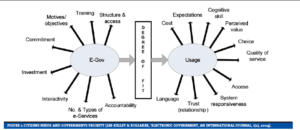 National governments worldwide are increasingly launching their e-Government initiatives for different motives in what is called e-Government drivers. e-Government has become a global phenomenon, similar to many other terms that have arisen during the nascent periods of the internet age. The UN report “Benchmarking e-Government: A Global Perspective” (United Nations Division of Public Economics and Public Administration and the American Society for Public Administration, New York, UN/ASPA, 2002) concluded that out of the 190 United Nations (UN) member states, 88.9 percent of their national governments use the Internet in some capacity to deliver information and services for citizens and businesses. More recently the UN “Global e-Government Readiness Survey 2005” assessed more than 50,000 features of e-Government websites of the 191 UN member states. This spread of e-Government around the world has attracted the attention of academic research. Understanding e-Government development and exploring variables that affect e-Government development have become an important research topic.
National governments worldwide are increasingly launching their e-Government initiatives for different motives in what is called e-Government drivers. e-Government has become a global phenomenon, similar to many other terms that have arisen during the nascent periods of the internet age. The UN report “Benchmarking e-Government: A Global Perspective” (United Nations Division of Public Economics and Public Administration and the American Society for Public Administration, New York, UN/ASPA, 2002) concluded that out of the 190 United Nations (UN) member states, 88.9 percent of their national governments use the Internet in some capacity to deliver information and services for citizens and businesses. More recently the UN “Global e-Government Readiness Survey 2005” assessed more than 50,000 features of e-Government websites of the 191 UN member states. This spread of e-Government around the world has attracted the attention of academic research. Understanding e-Government development and exploring variables that affect e-Government development have become an important research topic.
Jordan is a developing, middle-income country, which also has scarce natural resources and is rich with highly educated human resources. As a result, ICT is being seen by the Jordanian king and government as a tool to provide an outstanding chance for the country to become competitive in this area. The aim is for Jordan to become a regional IT centre in the Middle East, particularly among Arab countries. Trying to achieve this goal, e-Government was launched in Jordan in late 2000 with the vision to create a society where electronic government is a major contributor to the economic and social development. The vision of the latest version of the Jordanian e-Government states: “e-Government in Jordan is dedicated to delivering services to people across society, irrespective of location, economic status, education or ICT ability”. With its commitment to a customer-centric approach, e-Government will transform government and contribute to the Kingdom’s economic and social development.

Background
serving citizens and achieving better communication is one of the core goals of e-Government. This has been evident in e-Government definitions proposed by international organisations, governments, and researchers. One of the main drivers of e-Government in the developed countries was the response to e-Society needs. Most governments in the industrial and democratic countries understood the importance of establishing citizen-centred strategies. The president of the USA has said that e-Government will “shift power from a handful of leaders in Washington to individual citizens”. The reality of this statement may be confirmed by the actual rate and types of services accessed by the population in the USA, and the propensity of central government to meet that demand. The idea of government declaring itself as a supplier of services adopting a citizen-centred strategy in order to achieve social and economic development goals has recently caught the attention of numerous e-Government researchers who suggest that governments in general, assume that people demand e-Government services.

Figure 1 shows the percentage of individuals who used the internet in the European Union (EU) within the previous 3 months of conducting the survey. Figure 2 shows the actual use of the internet by surveyed individuals for obtaining information from public authorities’ websites.
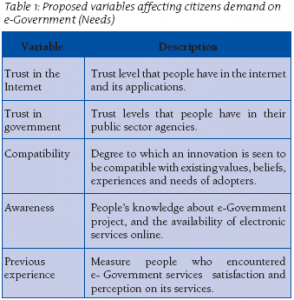 Interesting findings are exposed when comparing Table 1 with Table 2. These tables show that none of the EU-15 countries have a 100% match between potential and actual usage of online governmental information, with some countries having less than 10% of the population accessing e-Government. The scale of this gap is expected to be much larger within developing countries since the supply-side involves variables including what is available, the quality, and usability of the services. Added to this problem is that most governments and services are lacking the ability to address citizens’ true needs and requirements. Research also suggests that governments who pay attention to the demand side of e-Government have succeeded in achieving enormous benefits leading to effective e-Government outputs. Canada for example in the year 2005 was categorised for the fourth year in a row as the most e-Government-enabled country. The most likely reason for this is that Canada’s regular surveys of citizens and businesses attitudes and needs appear to be the most extensive, as per C.G Reddick, in his article ‘A two-stage model for e-Government growth: Theories and empirical evidence for U.S. cities. Government Information Quarterly, 21, 51-64 2004.
Interesting findings are exposed when comparing Table 1 with Table 2. These tables show that none of the EU-15 countries have a 100% match between potential and actual usage of online governmental information, with some countries having less than 10% of the population accessing e-Government. The scale of this gap is expected to be much larger within developing countries since the supply-side involves variables including what is available, the quality, and usability of the services. Added to this problem is that most governments and services are lacking the ability to address citizens’ true needs and requirements. Research also suggests that governments who pay attention to the demand side of e-Government have succeeded in achieving enormous benefits leading to effective e-Government outputs. Canada for example in the year 2005 was categorised for the fourth year in a row as the most e-Government-enabled country. The most likely reason for this is that Canada’s regular surveys of citizens and businesses attitudes and needs appear to be the most extensive, as per C.G Reddick, in his article ‘A two-stage model for e-Government growth: Theories and empirical evidence for U.S. cities. Government Information Quarterly, 21, 51-64 2004.
Research Model and Hypotheses
Based on a comprehensive review of previous e-Government studies, a list of variables have been selected (as shown in Table 1) to develop a new model which can examine the demand level on e-Government in the Jordanian context and how influential these variables are.
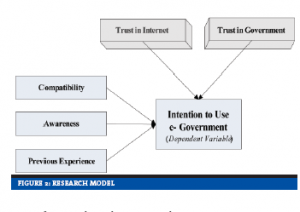 The dependent variable Intention to Use (IU) e-Government will determine the demand level on e-Government. Inde-pendent variables Trust in the Internet, Trust in Government, capability, compatibility, awareness and previous experience are expected to affect the demand level on e-Government and thus they are considered as citizen needs.
The dependent variable Intention to Use (IU) e-Government will determine the demand level on e-Government. Inde-pendent variables Trust in the Internet, Trust in Government, capability, compatibility, awareness and previous experience are expected to affect the demand level on e-Government and thus they are considered as citizen needs.
The basic hypothesises for this research are presented in Table 2.
Research Methodology
Sample
Demographics: 660 Jordanian participants completed the online survey. 85% of respondents are aged between 18-35 years old, 72% are males, 84% have at least university education, and 88% were located in the capital Amman or in another country. The findings are 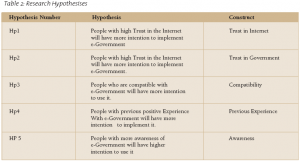 compatible with previous e-Government studies who studied the characteristics of internet and e-Government users. Finding that age, education, income, location, and gender are major elements in determining if a person is an internet user.
compatible with previous e-Government studies who studied the characteristics of internet and e-Government users. Finding that age, education, income, location, and gender are major elements in determining if a person is an internet user.
Capability level: In general, most of the participants are described to be highly connected and skilled internet users. 86% of respondents have more than 3 years experience in using the internet, 86% are accessing the Web on daily basis and 94% have internet connection either at home or work or both. Respondents internet capability points out that people who were able to complete a simple task of an online questionnaire which in its structure is somehow similar to an e-Government service must have a very high capability level to interact online.
In order to achieve the maximum level of efficiency in designing the online survey, most of the variables have been based on similar constructed questionnaires used in previous studies. All items used to measure the six variables intention to use, compatibility, previous experience, awareness, trust in state government, trust in the Internet) are rated on a scale of 1-5.
In summary, model and hypotheses testing was conducted with five independent variables (Trust in the Internet, Trust in Government, Capability, Compatibility, Awareness, Previous Experience) and one dependent variable (Intention to Use). The basic characteristics of these variables are presented in Table 3.
Table 3: Final regression variables
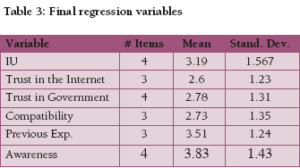
Results : General Intention to Use of e-Government in Jordan
Results revealed that Jordanian e-Society appears to have a respected demand on informative level of e-Government services. 66% of participants would use Government websites to gather information. However, by the increase of e-Government service level, citizens’ intention to use (IU) online services decreases. Only 29% of participants are willing to make payments online for a government service. Findings of survey are in agreement with previous conducted e-Government research in the USA Kampen et al. (Kampen, J., Snijkers, K & Bouckaert G., Public priorities concerning the development of egovernment in Flanders.Social Science Computer Review. 23(1), 136–139), 2005), who found that the by the increase of the level of service demand will decrease between users.
DISCUSSION
The purpose of this research is to test a model of e-Government adoption in Jordan. Results will be discussed in this section and suggestions will be presented with respect to what can be done to develop citizens IU e-Government.
Compatibility: Compatibility proved to be a signifi cant variable affecting IU e-Government. Compatibility is highly associated with the capability of a person to access and use the internet. How could we expect a person who does not have a PC, not connected to the Internet and does not regularly use it to be compatible with e-Government. Compatibility with computers and the Internet is very low amongst the unconnected Jordanian citizens (more than 90% of the population). The problem of compatibility is not only associated with non Internet users within e-Society itself (around 8% of the Jordanian population). Compatibility levels with online payments or providing personal information is low. This is mainly due to the absence of commercial online activities in Jordan. Only 25% of respondents have a credit or debit card, which makes the majority of them lack an online payment mechanism. Informative level of e- Government services at the moment is the most compatible method with the Jordanian e-Society. Jordan must not rush into e-Government projects before empowering citizens’ connectivity and skills boosting e-Commerce and, most importantly, integrating ICT technologies with citizens’ daily life and working processes eventually leading to the increase of compatibility with e-Government services. An additional important approach to increase compatibility with e-Government is that governments standardise themes and interfaces for all government websites making it easier for citizens to adopt online services.
Trust in the Internet: This has a positive relation with the IU e-Government. Results indicates that e-Society in Jordan have very low trust in the Internet. In fact, trust in the Internet has been the least scoring variable. What is alarming of this fi nding is that it come from experienced internet users. Low levels of trust in the Internet in Jordan is mainly because there are not enough legislations and laws covering online activities. Previous research proved that people who do not use the internet generally have much lower trust levels in it than the people who use it. Digitally divided people have lower trust. The government of Jordan needs to legislate and enable all laws related to online interactions and trade. Government in more advanced stage can set up a secure payment webpage for all government services. Also government must have a clear privacy and security policy on its websites that will reassure citizens and overcomes their doubts.
Trust in Government: Trust in government proved to be a signifi cant variable affecting IU e-Government. Government websites being a new channel for establishing relations between government and people could massively contribute to increasing trust by having adequate and up to date information. Agencies must convey to citizens that government employees have both the desire (benevolence) and ability (competence) to provide citizen-centred information and services designed to meet their needs. Showing budget documents, complaints service, and information of employees responsible for each service will boost transparency and empower trust in government and its websites leading to a more functional and effective e-Government.
CONCLUSION
Although citizens needs seem very obvious to e-Government experts, most governments fail to satisfy citizens’ needs concentrating on the emphasis of access. This prompted discussions on the general lack of e-Government usage primarily focusing on the ‘digital divide’ rather than social or behavioural reasons (peoples needs) that might drive people not to access and use e-Government. The study have identifi ed compatibility with e-Government, trust in Internet and trust in government as signifi cant variables that will increase citizens, demand on e-Government services. The study has also indicated that people in Jordan do not require advanced online services. With most governments around the world concentrating on the process of transformation in order to deliver online services, citizens’ needs and requirements are being neglected. Governments must integrate citizens’ needs to e-Government strategy and the process of service development in order to achieve maximum benefi ts from the e-Government promises.
Be a part of Elets Collaborative Initiatives. Join Us for Upcoming Events and explore business opportunities. Like us on Facebook , connect with us on LinkedIn and follow us on Twitter, Instagram.











